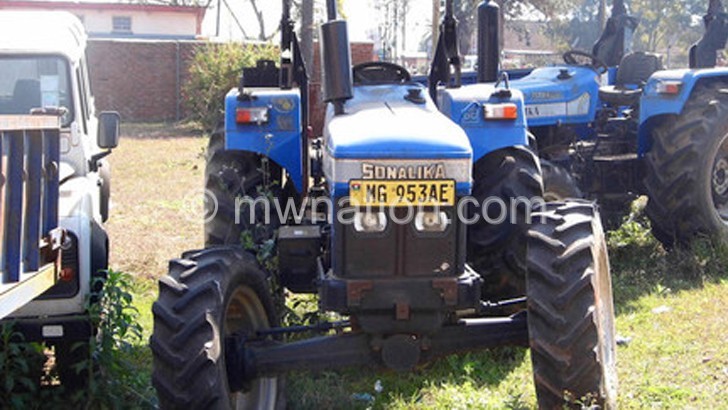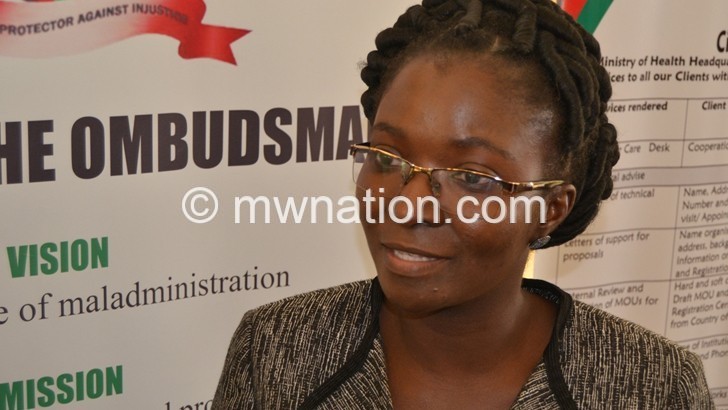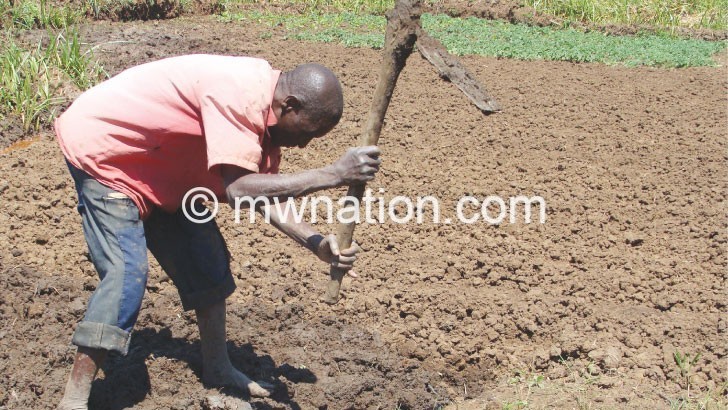Govt defies orders
Though the Ombudsman earned a public apology over government’s messy handling of a $50 million (about K37 billion) credit line from India for tractors, there is no joy to ensure proper closure of the matter.
The public protector called for prosecution of members of the internal procurement committee (IPC), who presided over the sale of the 77 tractors meant for local farmers and allegedly “benefited from the sale”, but this order has not been executed.

The National Audit Office (NAO) was ordered to audit the three India lines of credit by June 31 2017 and how the money was disbursed while the Ministry of Finance was ordered to give an account of all the funds collected so far from sale of the tractors, something that has not been done, according to the Ombudsman.
The Ministry of Agriculture, which issued the public apology last week, was told to provide a comprehensive report on the present and future accessibility of the 77 tractors that were sent to agriculture development divisions (ADDs) across the country.

The orders to the various agencies were followed up by letters with specific orders for actions, copies which Nation on Sunday has seen. For example, a letter dated March 27 2019 reminded the Ministry of Agriculture to follow up on other directives apart from the apology.
“The Ministry of Agriculture must build on its initial performance report of the tractors and prepare a comprehensive report on present and future accessibility of the farm machinery. The report must be explicit on the conditions of omnipresent accessibility of the farm machinery by local farmers.

“Green Belt Initiative and Ministry of Agriculture must prepare reports on poor performance of equipment which should include issues of problematic installations, poor quality equipment and faulty machines. These reports must be forwarded to ODPP. (Please note that Green Belt Initiative already produced their report in this regard),” reads part of the letter.
Were the orders to be followed, the Director of Public Prosecutions (DPP), in accordance with Section 126 (c) of the Constitution, should have been mandated to open proceedings into the matter with an investigating agency, such as Fiscal Police or the Anti-Corruption Bureau (ACB), probing it.
In an interview this week, Ombudsman Martha Chizuma confirmed that her office has been working to ensure that the recommendations are followed by the various agencies.
She said both the Ministry of Agriculture and the Green Belt Initiative were supposed to give comprehensive reports on the performance of the tractors, but only Green Belt Initiative complied.
“Yes, we have done that many times. Other institutions, like DPP, have at least been working on the referral we made to them on some criminal elements in the disposal process of the tractors. However, there are some directives that remain outstanding. For instance, one of our complainants had said he could not access the tractors because they were sold. We directed Ministry of Agriculture to provide a comprehensive report on the present and future accessibility of the 77 tractors that were sent to the ADDs across the country.
“As for Ministry of Finance, over and above the apology, we directed them to give an account of all the funds collected so far from sale of the tractors. To date they have not,” said Chizuma.
One of the non-complied directives, which the Ombudsman described as “quite troubling” is one made to NAO.
According to the Ombudsman, investigations had revealed some “untidy bits to the whole procurement and disposal process of the tractors with all appearances of fraud or criminal negligence”; hence, NAO was supposed to bring more light to the matter.
“We had noted during our investigations that the same agent that was used to procure these tractors was the same one used to procure some goods under the other two credit lines of 2008 for $30 000 and 2012 for $76 500. Some of the goods bought under these loans we found them dumped together with some of the goods bought together with the tractors that were bought in 2012 at PVHO.
“While at first NAO came to our office to get more information at the end of 2017, since then they have not been responsive to our communication on the same,” said Chizuma.
According to official correspondence, particularly a letter the Ombudsman wrote NAO on March 27 2019, which we have seen, NAO initially made inquiries into the matter in 2017, but it appears to have died a natural death.
The public protector had written NAO to remind them to report back on her order.
The letter further advised NAO to proceed with the investigations as the Supreme Court had ruled in favour of the Ombudsman against attempts by the Attorney General to review some of the orders in her report and ordered NAO to provide a progress report by May 10 2019.
“Following the findings I made in the matter, as contained in my report, herein enclosed’ I directed your office to conduct an audit on all three India credit lines’ through a letter dated July 20 2017, the former Auditor General advised my office that a team had been set up to conduct the audit,” wrote Chizuma.
But NAO spokesperson Rabson Kagwamminga, in an e-mailed response, said the office is almost through with the audit.
“Indeed, as mandated by the Constitution of the Republic of Malawi and the Public Audit Act, the Auditor General embarked on an investigative audit into allegations of maladministration and related irregularities on the purchase and disposal of farm machinery under India line of credit worth 50 million United States dollars.
“The investigation was triggered by the report which the office of the Ombudsman published in 2017… It is my pleasure to appraise the nation that the investigation is almost through. We will be submitting our report to the Office of the President and Cabinet (with copies to the Office of the Ombudsman) shortly,” said Kagwamminga.
On her part, DPP Mary Kachale, in an e-mailed response to a questionnaire, said her office was still waiting for Fiscal Police to complete investigations into the matter.
Why Ombudsman did not order restitution
While the Ombudsman’s admirers last week celebrated what they saw as rare victory when Capital Hill apologised on the tractor procurement, critics pointed out that her orders did not go far enough to take to account those responsible for the misprocurement.
But she explained, in an e-mail response, why she opted against ordering cancelling the sales.
Said Chizuma: “Our investigation revealed that there was something wrong with these tractors. The breakdown rate and cost of repair was too high. We observed this when we went to the ADDs and Green Belt Initiative and also [after conducting] some interviews with the people who bought them. Selling these tractors illegally was a serious wrong committed against Malawians, but to give them back that which is broken or with high chances of breaking was in our view plain insulting to the nation.
“Additionally, not all the people who bought the tractors were politicians or senior government officials, as the public feared, but ordinary private individuals as well following normal public tenders as advertised in the press.
“When one looks at the advert that was put in the paper, calling for buyers, unless you were privy to the whole issue, a normal reasonable person would not have known that the government did not have the legal authority to sell those tractors. And the law protects such as these as they were bona fide purchasers. They could have successfully challenged such repossession in courts.”
If government were to repossess the tractors, she said buyers had to be reimbursed their money.
The Ombudsman called for an investigation and audit on a number of credit lines the Malawi Government obtained from the Exim Bank of India to support agriculture projects in the country, including procurement of tractors.n





